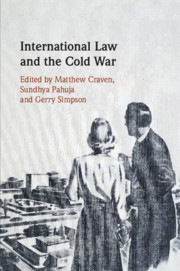Book contents
- International Law and the Cold War
- International Law and the Cold War
- Copyright page
- Dedication
- Contents
- Figures
- About the Editors
- About the Authors
- Acknowledgements
- 1 Reading and Unreading a Historiography of Hiatus
- Part I The Anti-linear Cold War
- 2 International Law and the Cold War: Reflections on the Concept of History
- 3 The Elusive Peace of Panmunjom
- Part II The Generative/Productive Cold War
- Part III The Parochial/Plural Cold War
- References to Cold War Volume
- Index
3 - The Elusive Peace of Panmunjom
from Part I - The Anti-linear Cold War
Published online by Cambridge University Press: 05 December 2019
- International Law and the Cold War
- International Law and the Cold War
- Copyright page
- Dedication
- Contents
- Figures
- About the Editors
- About the Authors
- Acknowledgements
- 1 Reading and Unreading a Historiography of Hiatus
- Part I The Anti-linear Cold War
- 2 International Law and the Cold War: Reflections on the Concept of History
- 3 The Elusive Peace of Panmunjom
- Part II The Generative/Productive Cold War
- Part III The Parochial/Plural Cold War
- References to Cold War Volume
- Index
Summary
Focusing upon the more-or-less contemporaneous Korean war, and the agreement ending the war at Panmunjom in 1953, this chapter focuses upon the way in which the Cold War is evoked, not in terms of a singular event with a singular beginning and a singular ending but, rather, as a series of events with multiple points of beginning and even multiple endings – an ‘end’ that does not occur all at once but is delivered in a series of instalments through time. In light of that analysis the question is raised whether the announcement that the Cold War is over is not merely a way of keeping it alive, preserving its historical valence in the present through its repression. What this brings into view, it is suggested, is the idea that the Cold War was not simply a titanic contest between self-styled hegemons, but rather a headlong struggle for the supreme model of political organisation in which command over history itself is one of the necessary objectives.
Keywords
- Type
- Chapter
- Information
- International Law and the Cold War , pp. 49 - 78Publisher: Cambridge University PressPrint publication year: 2019

